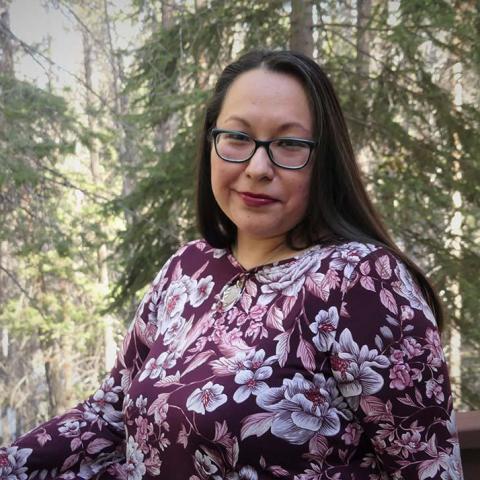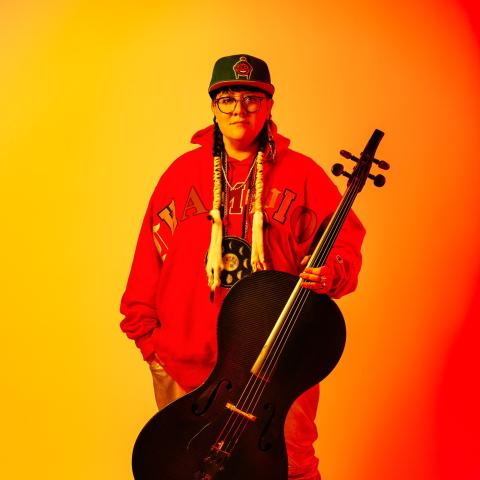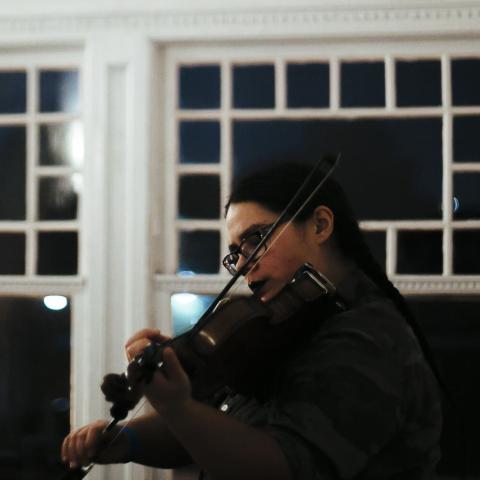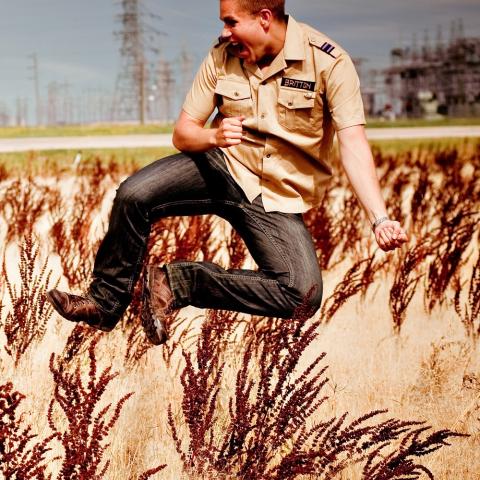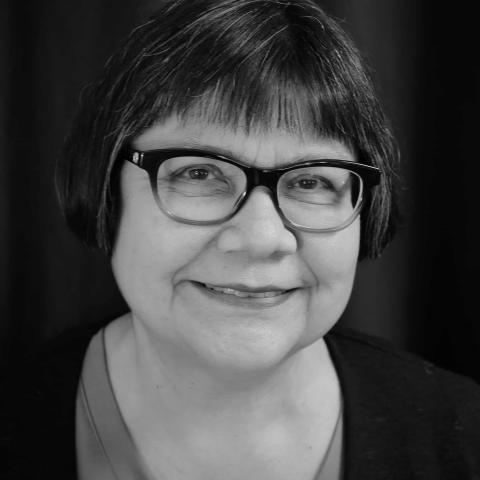Want to find out more about upcoming programs? Please subscribe to our mailing list.
Information sur le programme
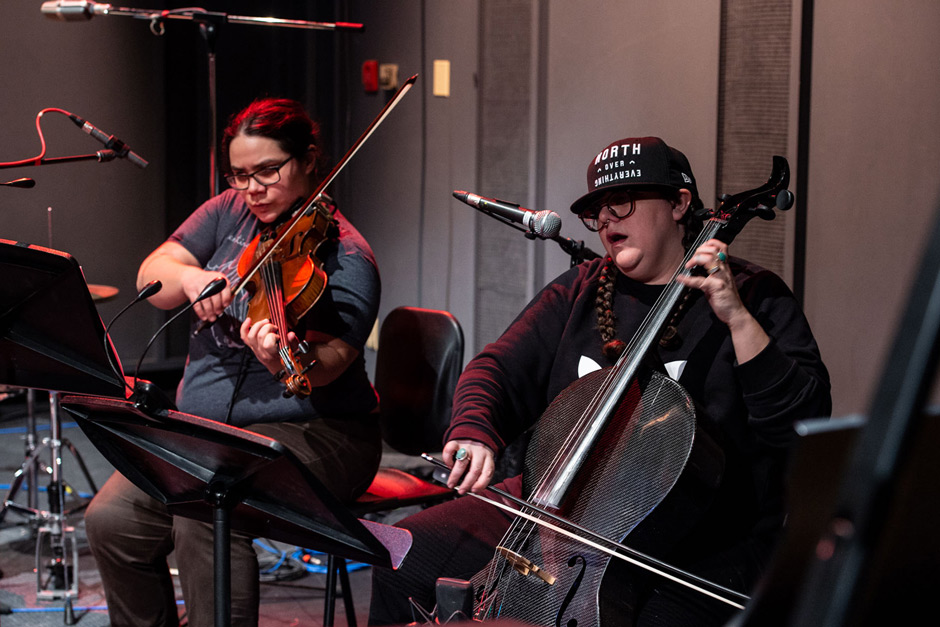
Melody McKiver and Cris Derksen, Indigenous Classical Music Gathering, Banff Centre 2019. Photo by Jessica Wittman
Aperçu du programme
Cette résidence réunit des musiciens autochtones œuvrant dans le domaine de la musique classique pour leur permettre de tisser des liens, de perfectionner leur art et de se bâtir un réseau solide de manière à faire avancer leur carrière, tout en leur donnant l’occasion de présenter leur travail en cours. Dans le cadre de ce programme, on s’intéresse particulièrement aux thèmes de l’écoute, des fréquences de résonnance de la terre , et des rapports avec la culture de l’artiste.
Que propose le programme?
À cette résidence, nous accueillerons volontiers les musiciens et compositeurs classiques autochtones qui souhaitent explorer des éléments expérimentaux ou réaliser des productions finies de leur travail au mieux de leurs capacités dans un environnement où ils profitent d’un soutien total
Les participants disposeront de périodes d’étude autonome à consacrer à leurs projets. De plus, ils se réuniront pour des présentations et ateliers, ainsi que pour se préparer à présenter leurs travaux en cours lors d’un concert qui fera partie du festival de quatre jours GATHER LISTEN HEAR (ÉCOUTER, ENTENDRE, ENSEMBLE)
À qui le programme s’adresse-t-il?
Ce programme est ouvert aux acteurs autochtones du domaine de la musique — de la région, du pays et du monde — y compris les compositeurs, les chanteurs, les instrumentistes, les chercheurs, les étudiants, les provocateurs, les perturbateurs, les défenseurs repoussant les limites de leur démarche artistique, les artistes œuvrant au service de leur communauté, les chefs de file en musique classique. Quoique l’on n’exige pas des candidats qu’ils aient un diplôme universitaire dans leur domaine, on s’attend à ce que ceux-ci travaillent dans ce domaine ou qu’ils aient l’intention de le faire.
Itinéraire
Le programme sera structuré quotidiennement pour inclure:
- Auto-pratique
- Rassembler les discussions
- Séances de développement professionnel des professeurs invités
- Expérience de performance collaborative.
Corps enseignant
Ce qui est compris
Your program fee includes a single bedroom on the Banff Centre campus for the duration of your program.
Get connected with other artists on campus and focus on your projects in a creative environment while we take care of the day-to-day essentials.
Using a credit-based system to dine on campus, our flexible meal plans allow you to select meals according to your own needs during your stay. Banff Centre can accommodate most dietary requests.
The Full Flex meal plan is calculated at $70 credit per day, equivalent to breakfast, lunch and dinner at our Buffet service.
This program offers opportunities to showcase your work-in-progress in one of our performance venues.
Create in one of our specialized studios.
Join in group seminars/workshops.
Your program fee includes free access to the swimming pool, climbing gym and fitness suite as well as discounted rates for classes at the Sally Borden Fitness and Recreation Centre.
The Paul D. Fleck Library and Archives - Current Services
The Library is delighted to support Banff Centre Participants, Artists, and Faculty with the following services:
- Open hours: 9:30 am to 1 pm, Mondays, Wednesdays, and Fridays.
- Access to collections, including program relevant books, scores, artists’ books, recordings, periodicals, and object library.
- Library accounts for borrowing materials.
- Digital Library, on campus and remote access.
- Library research assistance, by appointment.
- Archives research, by appointment only.
Please email library@banffcentre.ca or archives@banffcentre.ca for more information or assistance.
Enrich your experience and get to know other artists on campus by taking advantage of the activities and support provided by our Participant Resources team.
Coûts et aide financière
Droit de demande: 35 $
Les frais de dossier ne sont pas remboursables.
Les membres individuels du groupe doivent payer des frais d'inscription supplémentaires de 35 $ lors de l'acceptation.
*Une aide financière de 100% est disponible pour ce programme.
Si vous souhaitez être pris en compte, veuillez compléter la section Aide financière lors du téléchargement de vos documents justificatifs.
Le Centre des arts de Banff fournira des reçus officiels pour les frais de scolarité admissibles ainsi que pour l’aide financière et les bourses, comme l’exige la Loi de l’impôt sur le revenu. Vous recevrez un T2202 (Certificat pour frais de scolarité et d’inscription) pour les frais de scolarité admissibles payés, et un T4A (État du revenu de pension, de retraite, de rente ou d’autres sources) pour l’aide financière et les bourses applicables.
Contribuez à trouver le financement nécessaire pour votre expérience au Banff Centre! Consultez une liste de possibilités de financement d’ordre national et international ici.
Comment faire une demande
Apprenez-en plus sur les étapes pour compléter votre candidature.
Resume
A one-page resume or C.V. describing academic, professional, and other relevant experience.
Letter of Intent
What do you hope to achieve with your time here? Share background on the project you are working during your time at Banff Centre.
Resource Request
You will be asked a series of questions please also provide a list of repertoire you would like to perform or workshop. For each piece, please include the title, composer, approximate duration, instrumentation including a detailed list of percussion (if any), along with any technical requirements such as electronics, video, or staging directions. If the piece is in the process of being composed and some aspects are unknown, please provide as many details as you can.
Final resource allocation is at the discretion of the department.
Portfolio
Up to 5 samples of relevant recent artistic work.
- Performers can submit a Video – max 5 min.
- Composers can submit Scores - if you have links online or an MP3, both are acceptable.
Financial Assistance
Be sure to complete the Financial Aid section to be eligible for financial assistance.
Processus de sélection
Les participants sont sélectionnés par des arbitres impartiaux en fonction du matériel qu’ils ont soumis. En plus du mérite artistique, on tiendra compte de la probabilité que le travail de l’artiste profite du programme.
Les candidats sont avisés de leur statut dès que l’approbation est accordée.
Tous les programmes, les corps enseignants, les dates et les coûts, de même que les offres d’aide financière, peuvent faire l’objet de changements. Le coût du programme est sujet aux taxes applicables. S’il y a annulation, les frais non remboursables et les acomptes ne sont pas remis. Les autres coûts sont remboursés à la discrétion du Banff Centre. Les demandes doivent être déposées au plus tard à 23 h 59, heure normale des Rocheuses.
Contactez les admissions
Pour toute question relative à la préparation de votre candidature, veuillez contacter les admissions:
